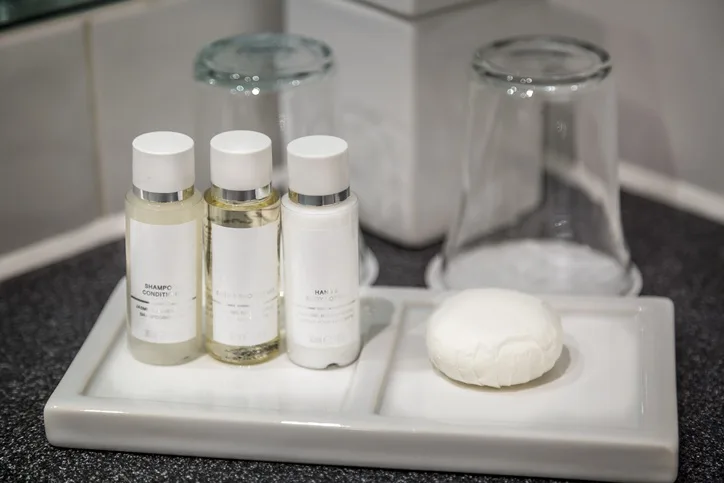
Holiday Inn parent company to phase out bathroom-mini amenities
The company expects the move will significantly reduce plastic waste.
InterContinental Hotels Group (IHG), the parent company of several hotel chains -- including the Holiday Inn and Crowne Plaza -- has announced plans to phase out miniature toiletries across its 843,000 guest rooms.
In their place, the company will move towards bulk-size bathroom amenities.
The transition is part of a larger effort to reduce plastic waste according to Keith Barr, CEO of IHG.
“It’s more important than ever that companies challenge themselves to operate responsibly – we know it’s what our guests, owners, colleagues, investors, and suppliers rightly expect," Barr said in a statement.
"Switching to larger-size amenities across more than 5,600 hotels around the world is a big step in the right direction and will allow us to significantly reduce our waste footprint and environmental impact as we make the change."
According to IHG, the organization uses an average of 200 million bathroom miniatures in its hotel rooms annually. Officials say bulk-size amenities will amount to a "significant reduction" in plastic trash.
In its efforts to reduce waste IHG has already begun to phase out plastic straws, a move that will prevent an estimated 50 million straws from entering landfills each year.
THE PLASTIC PROBLEM
While plastic is an inescapable part of modern society, the "miracle material" has a downside. It's estimated that 1 billion tonnes of plastic have been discarded since the 1950s and research suggests it will take up to 500 years for some forms to biodegrade.
According to the U.S. Environmental Protection Agency, only 8 per cent of the total plastic waste generated in 2010 in the U.S. made it to recycling plants.
Here in Canada, an estimated 90 per cent of the country's plastic is not properly disposed of.
A 2016 paper by the MacArthur foundation analyzes the current rate of plastic making its way into the world's oceans, and offers a projection for the future.
"The report acknowledges that while plastics and plastic packaging are an integral part of the global economy and deliver many benefits ... most plastic packaging is used only once," reads a statement on the Ellen MacArthur Foundation's website.
"Given projected growth in consumption, in a business-as-usual scenario, by 2050 oceans are expected to contain more plastics than fish (by weight)."
According to the report, at least 8 million tonnes of plastics leak into the ocean every minute, a number that's expected to double by 2050 if no action is taken.
The paper acknowledges that reducing the amount of plastic in the ocean will require "major" global collaboration, but large-scale initiatives by industry leaders are a step in the right direction.
Sources: IHG | The MacArthur Foundation






